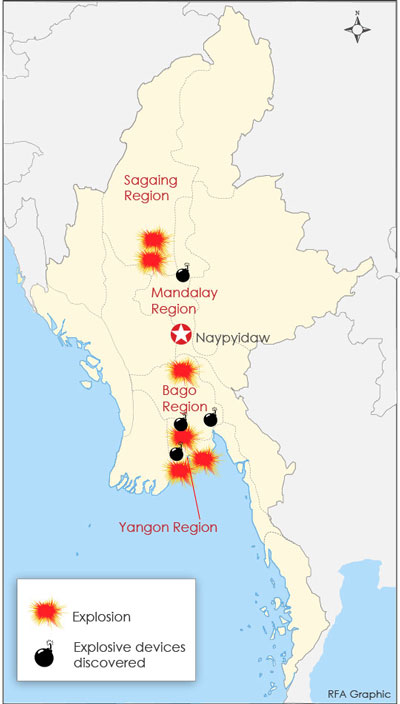



Myanmar police have cast a wider net for perpetrators of a slew of recent bombings based on evidence provided by six suspects arrested so far, a presidential spokesman said Wednesday, as reports suggested that some of those held had confessed to an organized bombing spree.
One key suspect held over Monday’s blast at the luxury Traders Hotel in Myanmar’s commercial hub of Yangon has been linked to an unexploded device found at a restaurant in the city earlier in the day, according to police.
The blast was one of at least six explosions in four cities—Yangon, Mandalay, Taungoo, and Sagaing—that have left two people dead and four others wounded. Four unexploded devices were also found in various cities and towns.
Police announced Wednesday they are searching for a seventh suspect, Saw Tun Tun, over Friday’s deadly blast at a guesthouse in Taungoo.
President Thein Sein’s spokesman Ye Htut said those held so far in connection with the bombings had provided information that had helped police identify other suspects.
“Security officials are working to arrest other connected perpetrators based on the testimonies of the arrested,” he told RFA’s Myanmar Service.
It was still too early to tell whether all the suspects held so far were connected to one another, he said.
Yangon Region Chief Minister Myint Swe, however, was quoted saying that three of four suspects arrested in Mon state’s Bilin township had confessed to being linked to all of the explosions.
“They said in their interrogations that they were involved in all of the bomb blasts,” the Yangon Times newspaper quoted him as saying.
Sagaing link
Police have also linked the trio to a bomb blast at the Shwe Pyae Sone Hotel in northern Myanmar’s Sagaing region in the early hours of Tuesday, according to the hotel owner.
“Police said that three people who were arrested in Bilin had stayed my hotel,” hotel owner Zaw Win Aung told RFA.
Officials have said the blasts may have been intended to smear Myanmar’s image as it takes the helm of the Association of Southeast Asian Nations (ASEAN) next year and prepares to host the Southeast Asian Games in December.  Bomb blasts were relatively common under Myanmar’s former junta regime, which usually blamed the explosions on armed exile groups or ethnic rebels.
Bomb blasts were relatively common under Myanmar’s former junta regime, which usually blamed the explosions on armed exile groups or ethnic rebels.
But they are rare under the quasi-civilian government which took power in 2011, implementing political and economic reforms and striving to end long-running ethnic insurgencies.
Key suspect
The key suspect behind the Traders Hotel bombing was arrested Tuesday after driving his motorbike through a barricade set up to stop him on a road in Bilin township, southeast of Yangon.
Identified as Saw Myint Lwin, 26, the suspect had previously stayed in the 9th-floor room in the ritzy Traders Hotel where the bomb went off on Monday night, injuring an American woman, police said.
He is also suspected of planting the bomb found earlier Monday at the Western Park Restaurant, police said.
Some local media reports identified Saw Myint Lwin as an ethnic Karen.
Agence France-Presse news agency quoted an unnamed source from the rebel Karen National Union as saying Saw Myint Lwin was a member of the group, but KNU officials rejected the claims.
Mandalay restaurant patrons
Local media reports identified the two other suspects held in connection with an unexploded bomb at the Golden Duck eatery in Mandalay as an ethnic Chinese woman named Chin Su Yin and a man named Aung Aung but also known as Mohamed Harley.
Ye Htut said the woman, though from Myanmar, was a Malaysian citizen, while a police officer at the Mandalay Police Department told RFA she was a Singapore citizen who had lived in Malaysia for ten years.
Aung Aung is a resident of Yangon’s Tamwe township, police officer Aung Shwe said.
Ye Htut said police scrutinizing CCTV footage of the eatery had spotted the woman “sitting at the table where the bomb was found.”
He added that the three apprehended in Bilin had been caught based on CCTV footage and evidence from the driver of a taxi they had ridden.
Nation's image
“We think that the attacks were carried out to frighten the people and to harm the nation’s image, but we will be able to say more after all of the perpetrators are investigated,” Ye Htut said.
Following the blasts, Minister of Hotels and Tourism Htay Aung met with businessmen in the industry to discuss security in the wake of the attacks, he said.
“We have gotten some more lessons on how to provide security for the [Southeast Asian] Games,” he said.
The blasts have triggered travel warnings from Western governments urging their nationals in Myanmar to exercise extreme caution.
Britain, France, the United States, and Australia have all issued advisories warning travelers to be vigilant, although they stopped short of advising against visits to the country.
Reported by Khin Khin Ei and Nay Rain Kyaw for RFA’s Myanmar Service. Translated by Khet Mar. Written in English by Rachel Vandenbrink.